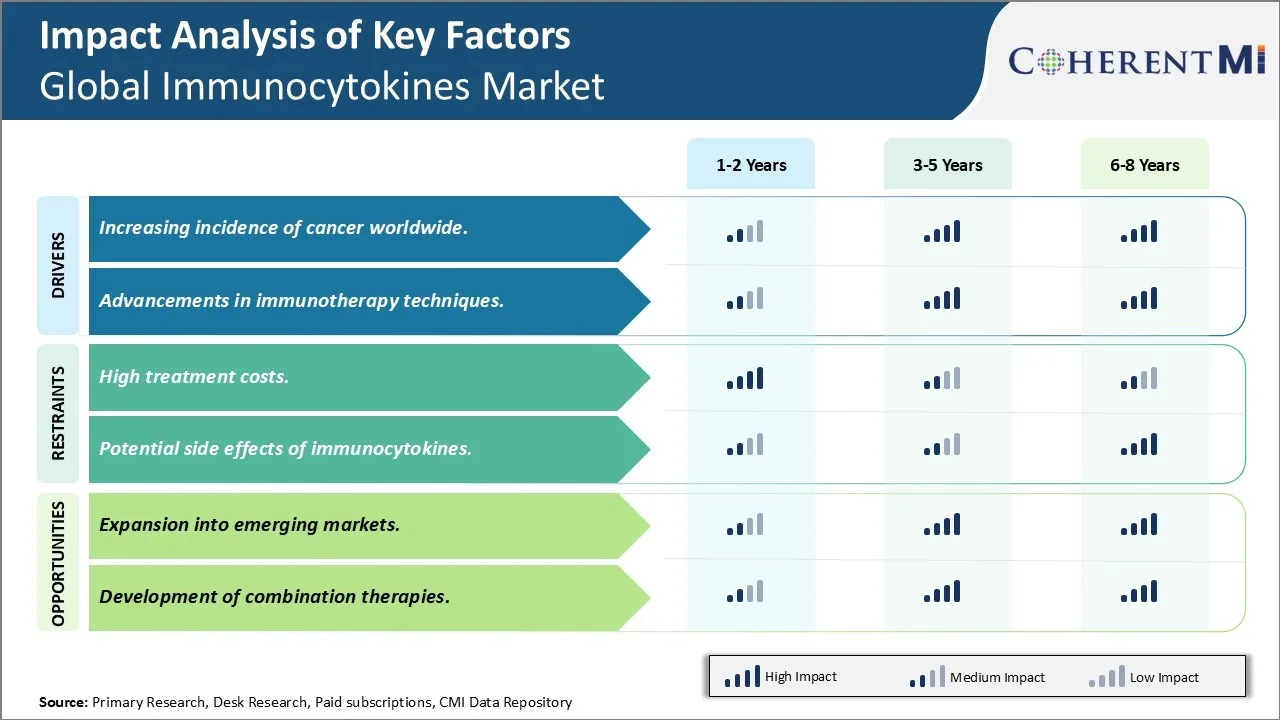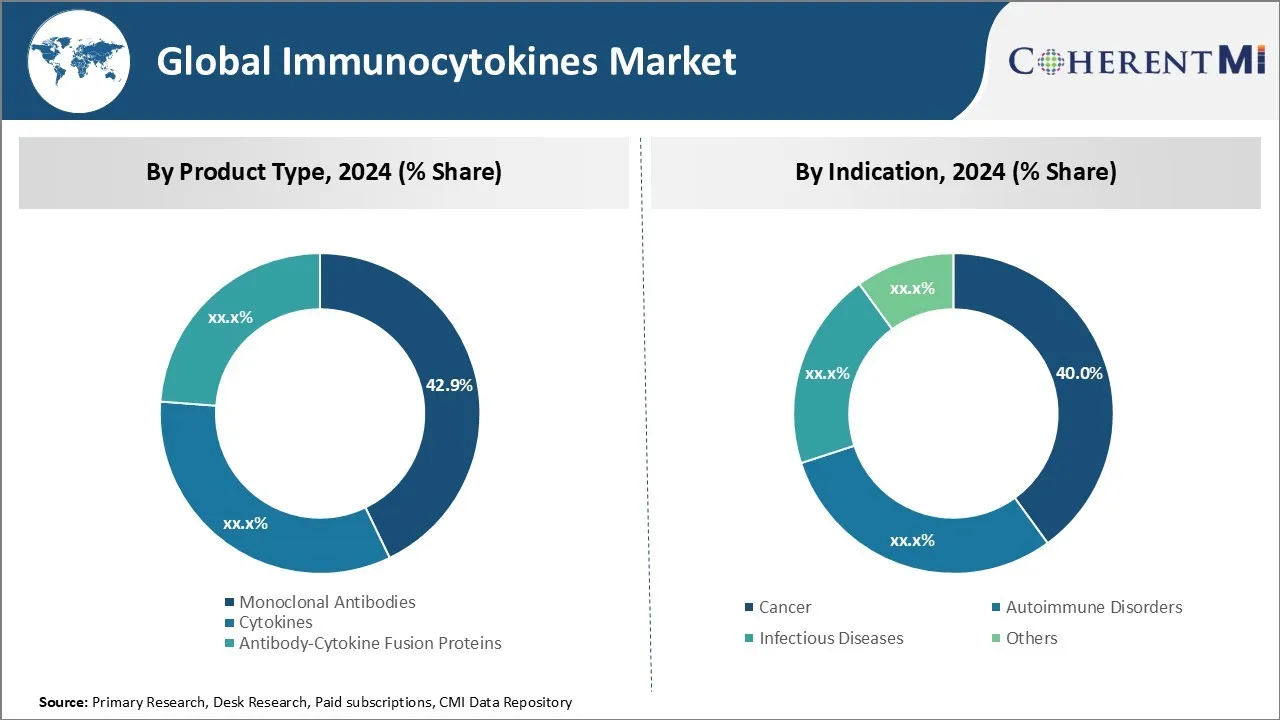世界の免疫サイトカイン市場 サイズ - 分析
グローバル免疫力士 市場は価値があると推定される 2024年のUSD 697百万 そして到達する予定 2031年までのUSD 5,374百万、混合の年次成長率で育つ 2024年から2031年にかけて41%のCAGR。
免疫シトキネ市場は、予測期間にわたって肯定的な成長傾向を目撃することが期待されます。 腫瘍学、自己免疫障害、感染症などのさまざまな治療分野における免疫組織の増加の応用は、需要を促進することが期待されます。 また、新規および効果的な融合タンパク質の研究と開発のための主要なプレーヤーによる上昇投資も市場成長に貢献することに期待されます。 しかし、生産の複雑性や免疫細胞膜の大規模な製造に関連した高コストなどの要因は、分析期間中に業界全体の拡大を妨げる可能性があります。
市場規模(米ドル) Mn
CAGR40.3%
| 調査期間 | 2025-2032 |
| 推定の基準年 | 2024 |
| CAGR | 40.3% |
| 市場集中度 | High |
| 主要プレーヤー | IOVanceバイオ医薬品株式会社, ブルーバードバイオ, ベリシウム製薬株式会社, 株式会社イオニス製薬, 株式会社ジュノセラピューティクス その他 |
お知らせください!
世界の免疫サイトカイン市場 トレンド
免疫療法技術の進歩
免疫療法の研究は、過去10年間に飛躍と限界に進んでいます。 免疫治療薬の作用の設計およびモードに継続的に改善がなされます。 免疫症の場合、科学者は腫瘍のターゲティングを高める革新的な方法を見つけ、より強力な免疫活性化を達成し、抵抗の課題を克服します。
焦点の1つは、優れた有効性のために免疫シトキネを修正するための組換えタンパク質工学技術を改善することにありました。 シトキネの半減期、抗原の特定性および生物配分のような特性は遺伝子および化学修正によって最大限に活用されます。 シトキネを結合して、新チェックポイント阻害剤、高価な分子、腫瘍関連の抗原に対するナノボディに大きな進歩があります。 これらの進歩により、免疫組織は腫瘍の微小環境における免疫反応をリクルート、活性化、増幅することができます。
アドバンスメントは、診断ツール、バイオマーカー、および組み合わせ免疫療法の分野でも目撃されています。 研究者は、マルチオミクスアプローチによる腫瘍の微小環境特性および免疫的特徴へのより深い洞察を得ています。  この助けは個々の忍耐強い癌のタイプおよび段階のためにカスタマイズされるimmunocytokinesを設計します。 臨床検査は、免疫療法、標的療法、チェックポイント阻害剤などの免疫療法と免疫細胞の併用がますますます増加します。 このようなコンボ戦略は、免疫刺激作用を最大限に高めることを目指しています。
この助けは個々の忍耐強い癌のタイプおよび段階のためにカスタマイズされるimmunocytokinesを設計します。 臨床検査は、免疫療法、標的療法、チェックポイント阻害剤などの免疫療法と免疫細胞の併用がますますます増加します。 このようなコンボ戦略は、免疫刺激作用を最大限に高めることを目指しています。
免疫療法技術の継続的な進化により、次世代免疫細胞は治療効果を大幅に向上させることが期待されます。 治療の抵抗を克服し、長期の寛解を誘発する可能性は、世界中の癌治療のための免疫シトキネのより大きい採用を奨励します。
市場機会 - 新興市場への拡大
世界的な免疫シトキネ市場のための重要な機会の1つは、新興市場への拡大の可能性です。 市場は、現在、北米と欧州の先進地域によって支配されているが、アジア太平洋、ラテンアメリカ、中東、アフリカの新興経済は、将来の成長のための有利な見通しを提示します。 がんや他の標的徴候に苦しんでいる大患者集団は、これらの地域を魅力的にします。 また、開発途上国における経済は着実に成長し、医療投資や支出能力が増加しています。 これは、今後数年で免疫シトキネのようなプレミアム薬のクラスの高い採用に潜在的に変換することができます。 この機会に資本を調達するために、市場プレイヤーは、新興市場でのローカル製造および供給ネットワークを確立することに焦点を合わせなければなりません。 好ましい規制ガイドラインと価格設定スキームは、免疫シトキネの摂取を促進するために開発する必要があります。 途上国地域では、大幅なアンメットニーズに対応することで、市場参加者は長期的にグローバル市場拡大を加速することができます。
主要プレーヤーが採用した主な勝利戦略 世界の免疫サイトカイン市場
新規免疫シトキネを発見し、パイプラインを強化することに焦点を当てる: Roche、Eli Lilly、Pfizerなどの主要なプレーヤーは、改良された効力および安全プロフィールの新免疫組織を発見するために研究開発に大きく投資しました。 たとえば、Roche は、2011-2014 年のフェーズ 3 臨床試験を実施し、固形腫瘍を治療するための MP-412 (IL-2 で溶かされる TNF-α の構成) を評価する。 試験は、第一次エンドポイントを満たしていないが、Rocheはより良い免疫細胞を開発するための洞察を得るのを助けました。
戦略的コラボレーションとパートナーシップ: 大手企業は、バイオテクノロジー企業や医療機関と提携し、免疫組織のパイプラインを推進しています。 例えば、2018年、Eli LillyはFavrilleと提携し、IL-2をベースにした免疫シトカインALT-801を開発。 初期段階でALT-801プログラムの権利を得るため、Eli Lillyが許可しました。 このような取引は、大規模なプレイヤーが革新的な資産にアクセスするのを助けます。
高いアンメットの必要性のまれな癌に焦点を合わせて下さい: 新しい治療オプションのための緊急の必要性を考えると、プレイヤーは、従来の薬が制限を持っているカタンスT細胞リンパ腫、myelomasなどのまれな癌のために免疫細胞を優先的に開発しました。 たとえば、リンパ腫を治療するためのRoche/NektarのBEAT-BCL2は、この空間で企業をうまく配置し、臨床試験で有望な結果を示しています。
積極的な商品化: 承認されると、企業は、腫瘍学や主要な意見のリーダーを標的とした意識キャンペーンを通じて免疫組織を広く推進しています。 たとえば、2018年のDadenのConsensusステートメントは、チェックポイント阻害剤ベースの免疫シトキネの商業可能性を強調し、RocheやGenMabなどの企業が資産のシナジーを促進するのに役立ちます。
セグメント分析 世界の免疫サイトカイン市場

エンドユーザーによる - 病院やクリニックは、プライマリトリートメント施設としてリード
エンドユーザー、病院、医院の面では、市場の最高のシェアに貢献します。 医学の専門性であること, 免疫シトキネは、腫瘍専門医や臨床免疫士の指導の下で主に投与されます. 免疫療法は、集中的な患者の監視、静脈内注入および免疫関連の有害事象の管理を含むほとんどの免疫療法の処置は病院か医院で行なわれます。 これらの施設には、ステージング、ドージング、応答評価に必要なインフラもあります。 自己免疫疾患に焦点を当てたさまざまな病院ベースの包括的ながんセンターと専門クリニックは、免疫細胞から標的する条件の研究開発と治療を支援するために来ています。 従って、病院および医院は主要なエンド ユーザー セグメントとして患者およびpredominateのための主要な接触を残します。
追加の洞察 世界の免疫サイトカイン市場
- 免疫シトキネ市場は、がんの増殖と従来の治療の制限が増加しているため、大幅な成長のために浸透しています。 Immunocytokinesは、シトキネの免疫反応調節と抗体の特異性を兼ね備え、副作用が少ない有望な代替品を提供します。 市場が成長するにつれて、研究開発につながる企業は競争優位性を獲得します。 市場の拡大は技術の進歩によって運転され、組合せ療法の採用を高め、好ましい臨床試験の結果。
競合の概要 世界の免疫サイトカイン市場
グローバル・イミノクチオクチオクチオクチオクチオクチオクチオクチオクチオクチオクチオクチオクチオクチオクチオクチオクチオクチオク、シチューンファーマ、アルトルバイオサイエンス、アストラゼネカPlc、アルケメスPlc、ブリストル・マイアスキブ、ノヴェリシス、ロチェ、アムゲン。
世界の免疫サイトカイン市場 リーダー
- IOVanceバイオ医薬品株式会社
- ブルーバードバイオ
- ベリシウム製薬株式会社
- 株式会社イオニス製薬
- 株式会社ジュノセラピューティクス
世界の免疫サイトカイン市場 - 競合関係

世界の免疫サイトカイン市場
(大手プレーヤーが支配)
(多くのプレーヤーが参入し、競争が激しい。)
最近の動向 世界の免疫サイトカイン市場
- 2024年5月、PPFグループが保有する免疫腫瘍学会社であるSOTIO Biotechは、次世代PD-1標的免疫細胞のSOT201の第1相臨床試験で患者を投与し始めています。 VICTORIA-01の研究では、高度な固体腫瘍のためのモノセラピーとしてSOT201の安全性、許容性、および初期の有効性を評価することを目指しています。
- 2024年2月、武田のオンコロジー・リーダーシップの追求は、中症免疫細胞腫瘍、モダカフスアルファ、およびR&Dパイプラインの3つの初期段階のCAR-T細胞療法候補の中止を発表しました。 竹田社長のChristophe Weberでは、腫瘍学分野における地位を確立することを目的としていますが、成功と挫折の両方に遭遇しました。
世界の免疫サイトカイン市場 セグメンテーション
- 製品タイプ別
- モノクローナル 抗体
- シトキネ
- 抗体-Cytokineの融合蛋白質
- インディケーション
- 癌
- 自己免疫障害
- 感染症
- その他
- エンドユーザーによる
- 病院・クリニック
- 研究機関
- 医薬品・バイオテクノロジー企業
- その他

購入オプションを検討しますか?このレポートの個々のセクション?
Ghanshyam Shrivastava - 経営コンサルティングとリサーチの分野で 20 年以上の経験を持つ Ghanshyam Shrivastava は、プリンシパル コンサルタントとして、生物製剤とバイオシミラーに関する幅広い専門知識を持っています。彼の主な専門知識は、市場参入と拡大戦略、競合情報、さまざまな治療カテゴリと API に使用されるさまざまな医薬品の多様なポートフォリオにわたる戦略的変革などの分野にあります。彼は、クライアントが直面する主要な課題を特定し、戦略的意思決定能力を強化するための堅牢なソリューションを提供することに優れています。彼の市場に関する包括的な理解は、リサーチ レポートとビジネス上の意思決定に貴重な貢献をします。
Ghanshyam は、業界カンファレンスで人気の高い講演者であり、製薬業界に関するさまざまな出版物に寄稿しています。
よくある質問 :
グローバルイモチオチオキネ市場の成長を妨げる重要な要因は何ですか?
高処理コスト。 免疫シトキネの潜在的な副作用は、グローバルイモチトキネ市場の成長を妨げる主要な要因です。
グローバル・イモチオチオキネ市場成長を牽引する主要な要因は何ですか?
世界のがんの発生率が高まります。 免疫療法技術の進歩。 グローバル・イミノシトキネ市場を牽引する大きな要因です。
世界的なImmocytokines市場における主要な製品タイプは?
主要なプロダクト タイプ区分はモノクローナル抗体です。
グローバル・イミノシトキネズ・マーケットで運営する主要な選手はどれですか?
Fate Therapeutics, Inc., Genopharm, ImmunGene, Kanaph Therapeutics, Merck KGaA, Philogen, CytImmune, Cytune Pharma, Altor BioScience, AstraZeneca Plc, Alkermes Plc, Bristol-Myers Squibb, Novartis, Roche, Amgenは主要なプレーヤーです。
グローバル・イミノキシトキネス・マーケットのCAGRとは?
2024-2031年のグローバル・イミノキシトキネズ・マーケットのCAGRが41%に予定されています。